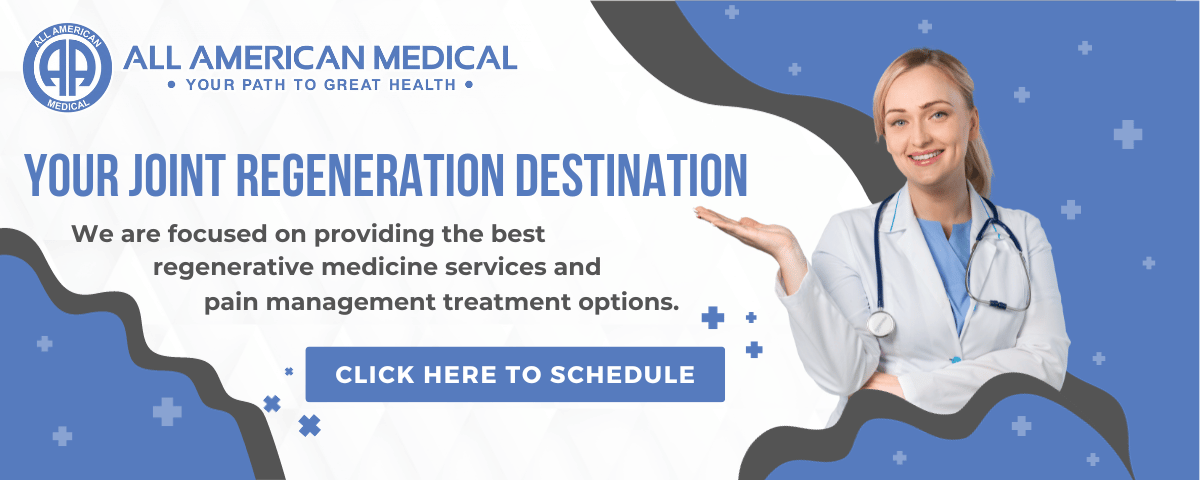
In our quest for quick pain relief, NSAIDs (Nonsteroidal Anti-Inflammatory Drugs) like ibuprofen, naproxen, and aspirin have become household staples. Widely available and frequently prescribed, these medications are often the first line of defense against various types of pain. However, while NSAIDs are effective in the short term, long-term use can carry several health risks.
Research has shed light on the less-discussed aspect of these common medications. Regular and extended consumption of these drugs has been linked to an increased chance of potentially life-threatening conditions. These findings raise significant concerns about the conventional approach to pain management.
At All American Medical, we recognize these risks and take a different approach, focusing on pain management that is both holistic and responsible. Our approach provides effective pain relief while minimizing the potential for harm. We emphasize treatments that address the underlying causes of pain rather than simply masking the symptoms. Through a combination of advanced techniques and personalized care, we offer a safer, more sustainable path to managing pain.

Understanding the Risks of Long-Term NSAID Use
NSAIDs are among the most commonly used medications globally for managing pain and inflammation. From a mild headache to chronic pain like arthritis, these drugs have been the go-to solution for both doctors and patients alike. Their over-the-counter availability and perceived safety have contributed to their widespread use. However, the convenience of NSAIDs masks a range of potential health risks, especially with long-term use.
Gastrointestinal Problems
One of the most well-known risks associated with prolonged NSAID use is gastrointestinal distress. These medications can disrupt the stomach’s protective lining, leading to ulcers, bleeding, and gastritis. In severe cases, these complications can result in life-threatening conditions requiring urgent medical attention.
Cardiovascular Risks
Studies have shown a concerning connection between long-term NSAID use and increased cardiovascular risks. Regular use, especially at higher doses, has been linked to a heightened risk of heart attacks and strokes. This is particularly worrying for individuals with existing cardiovascular conditions or those at risk of heart disease.
Kidney Damage
The kidneys can also be adversely affected by chronic NSAID consumption. They can reduce blood flow, potentially leading to chronic kidney disease or, in extreme cases, kidney failure. This risk is elevated in older adults and those with pre-existing kidney issues.
The realization of these risks has led to a growing need for a more responsible approach to pain management. It’s increasingly evident that a safe solution to chronic pain isn’t found in a pill bottle. It comes from more sustainable and safer treatment methods.
Responsible Pain Management: A Safer Alternative
With concerns about the long-term use of NSAIDs, responsible pain management has emerged as a compelling and safer alternative. But what exactly does it entail?
Holistic and Patient-Centric
The approach is holistic, considering the entire individual – their lifestyle, environment, and overall health – rather than just focusing on the site of pain. It involves thoroughly assessing the patient’s condition and a comprehensive treatment plan that may include various non-pharmacological therapies. The objective isn’t just to alleviate pain and enhance the body’s natural healing processes and overall well-being.
Addressing the Root Cause
Responsible pain management seeks to address the root cause of pain. For instance, if chronic back pain stems from poor posture or muscle imbalance, treatments would focus on correcting these issues rather than solely providing symptomatic relief.
Safer and Sustainable
By minimizing the reliance on medications like NSAIDs, responsible pain management reduces the risk of side effects and long-term health complications. It offers a more sustainable solution, as it aims to provide lasting relief and prevent the recurrence of pain.
At All American Medical, responsible pain management is at the core of our practice. We understand the importance of providing our patients safe, effective, and sustainable care, helping them lead healthier, pain-free lives.

Our Techniques
At All American Medical, our approach to responsible pain management incorporates various techniques. Each is tailored to address specific aspects of pain and its underlying causes.
Chiropractic Care
Chiropractic adjustments are central to our approach. By realigning the spine and other joints, chiropractic care can alleviate nerve pressure, improve mobility, and promote the body’s natural healing processes. This method is particularly effective for back pain, neck pain, and headaches, addressing the mechanical aspects of these conditions.
Physical Therapy
Physical therapy plays a pivotal role in responsible pain management. It involves personalized exercise programs, strength training, and flexibility exercises. They’re all designed to reduce pain, enhance mobility, and strengthen the muscles that support your joints. This approach not only provides immediate pain relief but also helps prevent future injuries.
Spinal Decompression
For patients suffering from herniated discs, sciatica, or spinal stenosis, spinal decompression is a highly effective treatment. This technique gently stretches the spine, creating negative pressure within the discs. The negative pressure promotes the retraction of bulging or herniated disc material. It facilitates the flow of nutrients and oxygen, essential for disc healing.
Active Release Technique (ART)
ART is a specialized form of soft tissue therapy designed to treat problems with muscles, tendons, ligaments, fascia, and nerves. It is highly effective for conditions like carpal tunnel syndrome, tennis elbow, and sciatica, providing relief by breaking down scar tissue and restoring normal tissue function.
PRP Injections
PRP injections, or platelet-rich plasma therapy, utilize the body’s natural healing agents to treat chronic pain, particularly in joints. By concentrating and injecting platelets from your blood into affected areas, PRP therapy accelerates healing and reduces pain without invasive surgery.
Additional Techniques
We also employ other techniques like massage therapy and the Graston technique, which further aid in relieving pain, improving circulation, and enhancing the body’s healing response.
Each method addresses the root cause of pain, offering a comprehensive and sustainable path to long-term well-being. By combining these treatments, All American Medical provides a multi-faceted approach to pain management tailored to each patient’s unique needs.

Final Thoughts
Considering the risks associated with prolonged NSAID use, managing pain effectively and safely is more important than ever. While these medications can provide short-term relief, their long-term effects can pose significant health risks. It’s crucial to consider alternatives that not only alleviate pain but also prioritize your overall health and well-being.
We understand that each patient’s pain is unique, and so are the solutions. Our team is committed to developing a personalized plan that suits your specific needs. We’ll help you move beyond temporary fixes to achieve long-term health and comfort.
If you’re seeking an effective and responsible way to manage your pain, we invite you to contact our Covington or Hammond locations. Let us help you take the first step towards a life free from chronic pain, with a treatment plan that’s tailored just for you.
